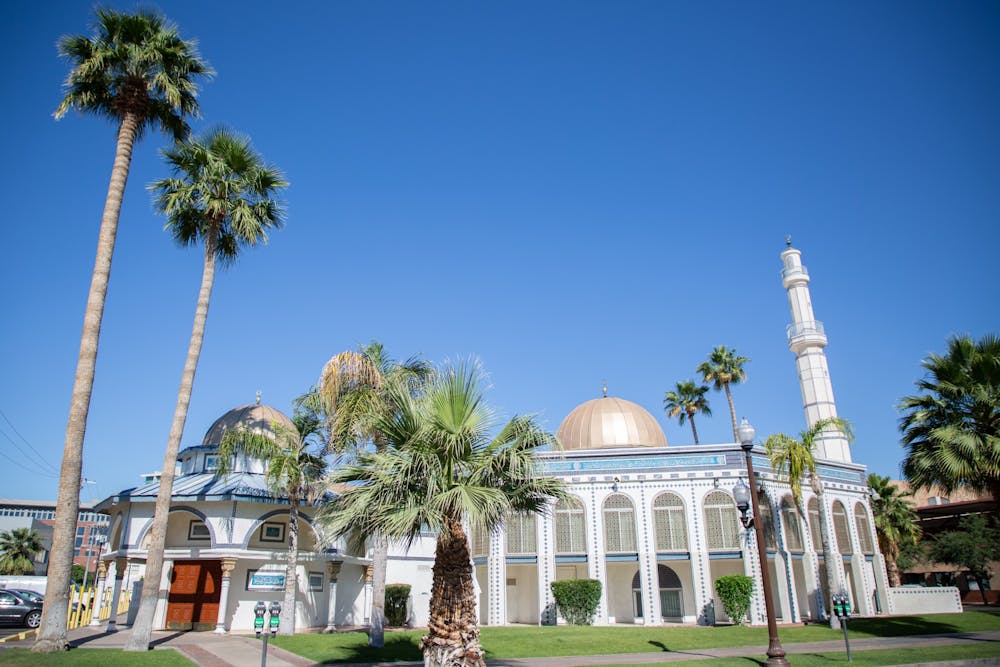You may have heard of intermittent fasting: A period of time where you abstain from eating, and instead only have a limited timeframe to indulge in your favorite foods. Now, imagine doing that every day for an entire month, but this time, no drinks either. Yes, that includes water. That is what Ramadan is like for over two billion people in the world.
Ramadan, a holy month within the Islamic calendar, marks the anniversary of the religion's founding. It is viewed as a sacred time for Muslims to strengthen their relationship with God. The primary method of doing so is through fasting. The breaking of fast is referred to as iftar.
The reasoning behind this process is to practice self restraint, one of the fundamental pillars of Islam. Other common practices throughout Ramadan include charity, praying and regularly reading the Qur'an, the religion's scripture.
Since April 2 when Ramadan began, Muslims all around the world – including students here at ASU – are partaking in fasting. The Ramadan experience can prove particularly challenging for students, especially those who had previously celebrated the holy month in Islamic nations.
Youssef Serag, a senior studying electrical engineering and member of the Muslim Student Association said in conjunction with the ICC Mosque in Tempe, MSA has events in the works to help celebrate Ramadan, including a Fast-athon on April 14, an event in which Muslim and non-Muslim students take part in a day of fasting together.
"I think it will provide a chance for the larger ASU community to get involved," Serag said. "It allows those who aren't as knowledgeable of the Islamic world to get an idea of what our traditions are like."
Serag said organizations like MSA can play a big part in making the Ramadan experience holy and fun for students.
Amr El Jack, a senior studying finance who attended high school in Qatar, said the most challenging aspect about fasting in the West compared to the Middle East is school-related accommodations.
"The school days would be shortened from seven to five hours," he said. "On top of that, teachers would limit the amount of homework assigned to us. Here, though, I'll still be having a night class during iftar. And the workload doesn't decrease, it only rises."
Such accommodations go beyond the education system. Shehab Suliman, a junior studying electrical engineering who has spent most of his life in Saudi Arabia said the process of abstaining for Ramadan was more difficult after moving to the United States.
"Restaurants were closed during the day and it's illegal to be drinking or eating in public before sunset," he said. "I think those changes definitely go a long way in helping with fasting since it removes all temptations."
Those accommodations are not the only things that help to ease the burden of fasting. The cultural relevance of Ramadan is another crucial aspect many international students miss the most.
Serag, who has also lived in Saudi Arabia, said the community and festivity of Ramadan is lost in the United States since Muslims make up 1.1% of the population.
"It's a festive time, Ramadan, back there," Serag said. "Everybody is fasting, the mosques are always crowded and when sunset hits, it feels like a moment of celebration."
Despite the unique challenges Muslim students face, the Islamic community at ASU is collaboratively going out of its way to ensure students have the best possible Ramadan experience they can.
"The local mosque has never been so crowded before," El Jack said. "People are all bringing dishes to share and getting to know each other. So in some ways, it feels just like home."
Such a sentiment has also been shared by Suliman, who said Ramadan provided him the chance to grow closer with other Muslim students.
"Many of my friends who have grown up here invite me to their homes for iftar," he said. "Their families make me feel welcomed despite coming here from halfway around the world."
Regardless of the challenges they face, El Jack and Suliman still feel the spirit of Ramadan.
"Wherever you are in the world doesn't change the fact that it's still Ramadan," Serag said. "I hope that Muslim students coming here to ASU from across the globe still feel like this University is their home away from home."
Reach the reporter at amimam1@asu.edu and follow @amir_amimam1 on Twitter.
Like The State Press on Facebook and follow @statepress on Twitter.

Amir Imam is a reporter for the Echo, providing a unique lens for The State Press and ASU to view pop culture and media through. His articles have covered major projects being done by professors, news in pop culture, and events relevant to students.




